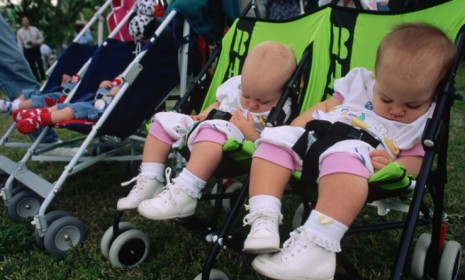The 'concerning' rise in twin births
The rate at which U.S. women are having twins has climbed dramatically, worrying some experts since twins are born earlier and smaller than solo babies

A free daily email with the biggest news stories of the day – and the best features from TheWeek.com
You are now subscribed
Your newsletter sign-up was successful
You're not seeing double — the number of twins born to American women has shot higher over the last three decades, according to a new study by the Centers for Disease Control, with some troubling ramifications. Here's what you should know:
How sharply have twin births risen?
The twin birth rate climbed by 76 percent between 1980 and 2009. At the start of that period, 189 out of every 10,000 babies born in the U.S. was a twin. Twenty-nine years later, that figure had jumped to 333 out of 10,000. That means that as of 2009, 1 in 30 American newborns was a twin, while in 1980 only 1 in 53 were. And the twin birth rate is rising even faster for older moms — more than 200 percent for U.S. moms in their 40s.
The Week
Escape your echo chamber. Get the facts behind the news, plus analysis from multiple perspectives.

Sign up for The Week's Free Newsletters
From our morning news briefing to a weekly Good News Newsletter, get the best of The Week delivered directly to your inbox.
From our morning news briefing to a weekly Good News Newsletter, get the best of The Week delivered directly to your inbox.
Why the big change?
Two reasons. First, women are waiting until they're older to have kids, and older women have older eggs which are more prone to twinning. About 2 percent of moms 24 or younger have twins, compared to 4 percent in their late 30s, and 7 percent in their 40s. The second factor is an increased use in fertility treatments, such as in vitro fertilization, in which several embryos can be implanted at one time. That ups the odds of success... and of twins.
Isn't this good news?
Yes and no. For older women who'd worried if they could ever conceive, "having twins is a blessing," Barbara Luke, a Michigan State University expert on twins, tells the Associated Press. But the trend is also "concerning," says Linda Carroll at MSNBC. Most twin newborns do well, says Joyce A. Martin, the study's lead author, but "twins tend to be born earlier and smaller. Their mothers are more likely to require hospitalization. And the twins themselves are more likely than singletons to require hospitalization." One solution: Many infertility centers now implant one embryo at a time.
A free daily email with the biggest news stories of the day – and the best features from TheWeek.com
Sources: Associated Press, MSNBC, USA Today
-
 ‘Poor time management isn’t just an inconvenience’
‘Poor time management isn’t just an inconvenience’Instant Opinion Opinion, comment and editorials of the day
-
 Bad Bunny’s Super Bowl: A win for unity
Bad Bunny’s Super Bowl: A win for unityFeature The global superstar's halftime show was a celebration for everyone to enjoy
-
 Book reviews: ‘Bonfire of the Murdochs’ and ‘The Typewriter and the Guillotine’
Book reviews: ‘Bonfire of the Murdochs’ and ‘The Typewriter and the Guillotine’Feature New insights into the Murdoch family’s turmoil and a renowned journalist’s time in pre-World War II Paris